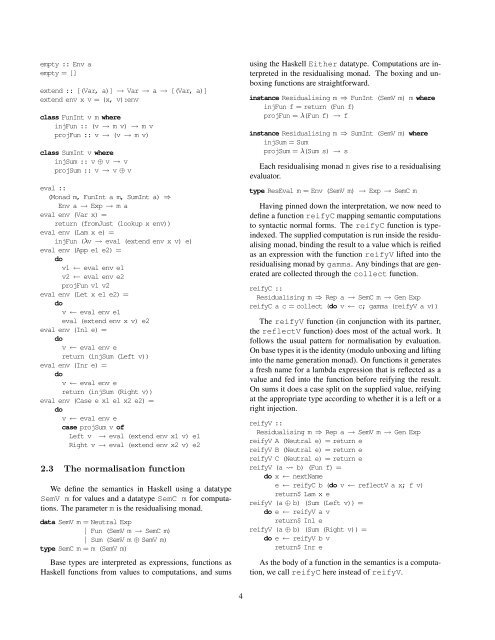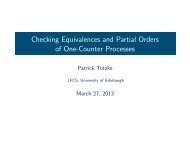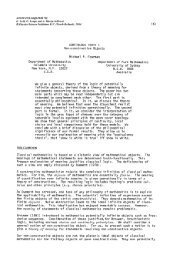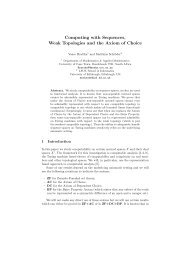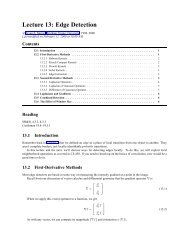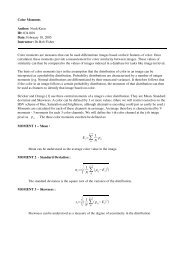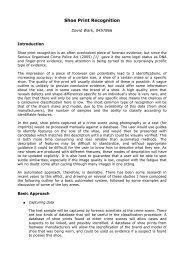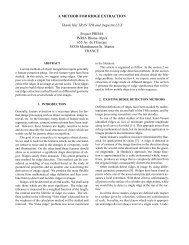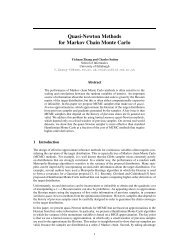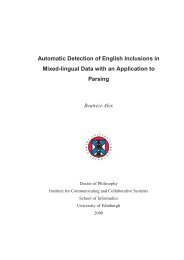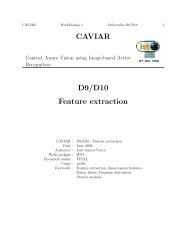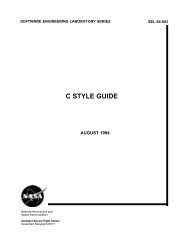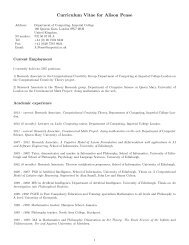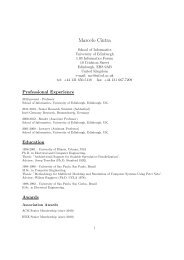Accumulating bindings - University of Edinburgh
Accumulating bindings - University of Edinburgh
Accumulating bindings - University of Edinburgh
Create successful ePaper yourself
Turn your PDF publications into a flip-book with our unique Google optimized e-Paper software.
empty :: Env a<br />
empty = []<br />
extend :: [(Var, a)] → Var → a → [(Var, a)]<br />
extend env x v = (x, v):env<br />
class FunInt v m where<br />
injFun :: (v → m v) → m v<br />
projFun :: v → (v → m v)<br />
class SumInt v where<br />
injSum :: v ⊕ v → v<br />
projSum :: v → v ⊕ v<br />
eval ::<br />
(Monad m, FunInt a m, SumInt a) ⇒<br />
Env a → Exp → m a<br />
eval env (Var x) =<br />
return (fromJust (lookup x env))<br />
eval env (Lam x e) =<br />
injFun (λv → eval (extend env x v) e)<br />
eval env (App e1 e2) =<br />
do<br />
v1 ← eval env e1<br />
v2 ← eval env e2<br />
projFun v1 v2<br />
eval env (Let x e1 e2) =<br />
do<br />
v ← eval env e1<br />
eval (extend env x v) e2<br />
eval env (Inl e) =<br />
do<br />
v ← eval env e<br />
return (injSum (Left v))<br />
eval env (Inr e) =<br />
do<br />
v ← eval env e<br />
return (injSum (Right v))<br />
eval env (Case e x1 e1 x2 e2) =<br />
do<br />
v ← eval env e<br />
case projSum v <strong>of</strong><br />
Left v → eval (extend env x1 v) e1<br />
Right v → eval (extend env x2 v) e2<br />
2.3 The normalisation function<br />
We define the semantics in Haskell using a datatype<br />
SemV m for values and a datatype SemC m for computations.<br />
The parameter m is the residualising monad.<br />
data SemV m = Neutral Exp<br />
| Fun (SemV m → SemC m)<br />
| Sum (SemV m ⊕ SemV m)<br />
type SemC m = m (SemV m)<br />
Base types are interpreted as expressions, functions as<br />
Haskell functions from values to computations, and sums<br />
using the Haskell Either datatype. Computations are interpreted<br />
in the residualising monad. The boxing and unboxing<br />
functions are straightforward.<br />
instance Residualising m ⇒ FunInt (SemV m) m where<br />
injFun f = return (Fun f)<br />
projFun = λ(Fun f) → f<br />
instance Residualising m ⇒ SumInt (SemV m) where<br />
injSum = Sum<br />
projSum = λ(Sum s) → s<br />
Each residualising monad m gives rise to a residualising<br />
evaluator.<br />
type ResEval m = Env (SemV m) → Exp → SemC m<br />
Having pinned down the interpretation, we now need to<br />
define a function reifyC mapping semantic computations<br />
to syntactic normal forms. The reifyC function is typeindexed.<br />
The supplied computation is run inside the residualising<br />
monad, binding the result to a value which is reified<br />
as an expression with the function reifyV lifted into the<br />
residualising monad by gamma. Any <strong>bindings</strong> that are generated<br />
are collected through the collect function.<br />
reifyC ::<br />
Residualising m ⇒ Rep a → SemC m → Gen Exp<br />
reifyC a c = collect (do v ← c; gamma (reifyV a v))<br />
The reifyV function (in conjunction with its partner,<br />
the reflectV function) does most <strong>of</strong> the actual work. It<br />
follows the usual pattern for normalisation by evaluation.<br />
On base types it is the identity (modulo unboxing and lifting<br />
into the name generation monad). On functions it generates<br />
a fresh name for a lambda expression that is reflected as a<br />
value and fed into the function before reifying the result.<br />
On sums it does a case split on the supplied value, reifying<br />
at the appropriate type according to whether it is a left or a<br />
right injection.<br />
reifyV ::<br />
Residualising m ⇒ Rep a → SemV m → Gen Exp<br />
reifyV A (Neutral e) = return e<br />
reifyV B (Neutral e) = return e<br />
reifyV C (Neutral e) = return e<br />
reifyV (a b) (Fun f) =<br />
do x ← nextName<br />
e ← reifyC b (do v ← reflectV a x; f v)<br />
return$ Lam x e<br />
reifyV (a ⊕ b) (Sum (Left v)) =<br />
do e ← reifyV a v<br />
return$ Inl e<br />
reifyV (a ⊕ b) (Sum (Right v)) =<br />
do e ← reifyV b v<br />
return$ Inr e<br />
As the body <strong>of</strong> a function in the semantics is a computation,<br />
we call reifyC here instead <strong>of</strong> reifyV.<br />
4


